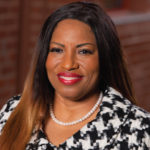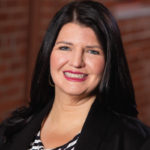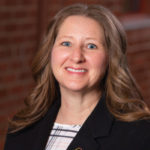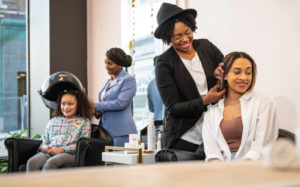By Olivia Miller
 West Virginia’s chemical industry has seen many phases since its early beginnings as the nation’s leading salt producer in the 1800s. The industry has been transformed by technology and smart manufacturing, a global market and sudden spikes in demand, along with increased diversity in leadership.
West Virginia’s chemical industry has seen many phases since its early beginnings as the nation’s leading salt producer in the 1800s. The industry has been transformed by technology and smart manufacturing, a global market and sudden spikes in demand, along with increased diversity in leadership.
Manufacturers have long been drawn to the Mountain State thanks to the 400-million-year-old salt brine deposits that originated well before the formation of the Appalachian Mountains when modern-day West Virginia was covered by the waters of the now-extinct Iapetus Ocean. The salt brines serve many purposes—chlorine is used in water treatments, and the brines contribute to the manufacturing of automobile gasoline and bleach. The abundant water supply, gas reserves and salt brine deposits of the Mountain State have allowed the industry to thrive for generations and established West Virginia as a global chemical and polymer hub.
Today, though, the chemical industry in the state is entering a new phase—with women at the forefront of operations. This story highlights five women who are paving the way for the next generation of chemical engineers in West Virginia and leading the state’s industry to new heights.
Introducing the Leading Ladies
Nicole Newell is the first female and first African American plant manager of Chemours Washington Works in Wood County, WV. It is the company’s largest advanced performance materials manufacturing site. Originally from New Orleans, LA, Newell joined Chemours in December 2020 and has over 25 years of experience in the chemical industry.
Her role has changed quite a bit since she started. In one of Newell’s first assignments as a project engineer, she was making paint for new specialty vehicles, namely Mary Kay’s famous pink and John Deere’s iconic green. Today, she manages over 500 people and is responsible for managing security and environmental and wastewater permits for the entire industrial complex. Washington Works produces material substrates for semiconductors, lithium-ion batteries and the 5G industrial sectors, helping the U.S. secure a domestic supply of these valuable chemicals.
Ashley Rine is the chemical solutions integrated operations leader for Performance Chemicals and Intermediates (PCI) at Chemours based in Belle, WV. A native of Williamstown, WV, her role requires her to have her finger on the pulse of the entire supply chain. PCI has cohorts in Asia Pacific, Europe and Latin America. PCI is North America’s sole producer of dimethyl sulfate and glycolic acid, which are used in cleaning and disinfectant makers, pharmaceuticals, oil and gas, fabric care, electronics, water treatment and other specialty markets.
Rine was inspired to be an engineer at an early age. Her father worked at a chemical manufacturing plant, and she would often attend family days, where she was able to take tours of the plant. The manufacturing environment appealed to her, and she found that working in the industry was accessible to women. Rine graduated from West Virginia University
in May 2003 and began working at the Belle plant a week and a half later.
Alicha Hunt is the operations manager at Belle Chemical Company, overseeing production and ensuring the company is meeting its targets. She also manages safety and ensures maintenance work is completed. Most of the chemicals produced at the plant are used in municipal water treatment facilities, while others are used in the electronic and medical industries. Hunt is a native of Belle, WV, and studied at the West Virginia Institute of Technology.
For Hunt, the decision to study chemical engineering was simple—through her childhood, she thoroughly enjoyed science and chemistry. She began her career designing facilities in Kuwait, which led to the realization that she wanted to be on the ground in the plant and understand the manufacturing side instead of doing design work.
Shannon Huber is the site director for Dow’s West Virginia Operations (WVO), which includes the South Charleston site and plants in Institute, WV, and at the West Virginia Regional Technology Park.
“Ultimately, my job is to ensure the Dow WVO team is successful by creating a culture where they can continue to be innovative and flexible to meet customer needs. Inclusion and sustainability must also be part of how we do work to ensure longevity of the site and the company, and we’re working hard to drive Dow’s environmental, social and governance goals, including being carbon neutral by 2050,” Huber says. “Dow’s vision is to be the most innovative, customer-centric, inclusive and sustainable materials science company in the world. West Virginia has a history of innovation in science and chemistry, and we want to foster an organization that continues that legacy.”
Dow’s products go into items we use every day, such as dish soap, cleaners, paint, car wax, makeup, deodorant and motor oil. The products also enable clean energy, eliminate food waste and replace lead pipes.
Barbara Buck is the vice president and plant manager at Covestro in South Charleston. She has been with the company for 29 years. Buck has the overall responsibility of ensuring the safe and efficient operation of the facility, as well as staffing, operations, maintenance, training and development, costs and corporate business and cultural objectives. Covestro produces standard and tailored polyurethanes, which are largely used in soft and rigid foam applications, including mattresses, furniture, car seat foam, wind turbine rotor blades and insulation. The chemicals also have applications in vehicle parts, electronic devices and medical applications.
A Greater Responsibility
Today’s culture demands greater moral and social responsibility from large corporations than ever before. The success of any company is driven by the well-being of its workers, which, in turn, is driven by the quality of the town where the workplace is located, including access to safe drinking water and air to breathe and the security of those resources.
As such, the chemical industry in West Virginia has developed initiatives to support the local community by funding scholarships, participating in community events and offering competitive benefits.
Rine cited the efforts by Chemours to offer progressive monetary, parental leave and other benefits to its employees
to improve the balance of work and life. The company also offers scholarships for high school students pursuing STEM careers and puts a strong emphasis on community outreach.
“One of the very cool things that our corporation offers is what we call the Future of Science and Chemistry Scholarships,” Rine says. “The scholarship amounts are meant to have a serious and significant impact on the recipients. They are not just college scholarships; they are also available for technical trades.”
At Chemours, Newell has participated in a food and shoe drive with United Way, supplied food to front-line workers during the pandemic and assisted in American Red Cross blood drives and local cleanups along the Ohio River, where the company is located.
“We definitely want to support activities there and help preserve the river and make it a beautiful place for people to play and enjoy with their families,” Newell says.
Hunt says Belle Chemical Company will be starting an internship program in the summer of 2022. The company also offers scholarships to local high school students who aspire to pursue a career in a STEM-related discipline.
Huber notes that Dow hires interns and co-ops at its West Virginia sites. At WVO, the company also has several employee resource groups focused on inclusion, including the Global African Affinity Network, programs for LGBTQ+ inclusion, new hires and the Women’s Inclusion Network, to name a few. Additionally, professional development opportunities are also offered to employees.
“I’ve found a company that shares my values and is willing to support me in challenging times, and I’ve been willing to make career changes that don’t necessarily follow the standard career path,” Huber says. “As a result, I love my job, and this inspires and motivates me in my own work and to help my team feel the same way about the work they do.”
Buck is looking forward to the challenge of meeting Covestro’s corporate sustainability goals, which are aligned with the United Nations’ sustainability goals.
“Circularity is a guiding principle at Covestro,” Buck says. “A circular economy is key to protecting the climate and the environment, as well as preserving limited resources.”
Covestro also offers internships and co-op internships to budding engineers, as well as professional development to its employees, including paying for continuing education related to their job.
Being a Woman in Engineering
At large, men continue to dominate the STEM workforce. According to the U.S. Census Bureau, while women make up nearly half of the U.S. workforce, they only account for 27% of all STEM workers.
Research conducted by the Society of Women Engineers, the world’s largest, not-for-profit educational and service organization dedicated to empowering women to succeed in engineering, showed that only 13% of engineers in the workforce are women. Although the technology industry has been evolving, it is no secret that engineering is a male-dominated sector.
“It’s definitely changing,” says Hunt. “I still don’t think there are nearly enough women, but today, there are more than when I went to school. I think the most important piece of advice for women pursuing engineering is to believe in their own abilities. Second, find a mentor. Have somebody to help you grow as a person and have your back. Have faith in yourself and get somebody there that can help you navigate whenever your faith isn’t as strong as what it needs to be.”
Newell has mostly worked in small towns where, on average, people have not seen women, or people of color, working in engineering roles.
“There aren’t a lot of minorities in this field. I remember at my first plant manager assignment, I had a lady in the community that I had to visit, and she said, ‘Wow, you don’t look like a plant manager,’ and I said to her, ‘We come in all shapes, sizes and colors, and we’re very diverse, just like everybody else,’” Rine says. “So, that has been a bit of a challenge at times. The best thing I can do is come to work, be my best self and show them that I am intelligent. I have my reputation and integrity to back me up.”
Newell advises young engineers to grow on a technical and interpersonal level.
“Look for opportunities to grow your interpersonal skills, whether it’s working on the United Way committee or doing some type of company outreach,” Newell says. “The first thing I did was volunteer at a domestic violence shelter. I continue to do that to this day, and I’m excited that my company allows me the opportunity to do that.”
Chemours has committed to building a diverse global workforce of 50% women by 2030 and working toward a goal of a 20% ethnically diverse U.S. employee base.
“At Chemours, we are much above the West Virginia workforce participation of females,” Rine says. “In terms of females here, although it’s male-dominated, there are still significantly more women working here compared to the state participation level. I think you just have to be confident in your skills and know that you’re going to land on your feet, and if you don’t know, you’ll figure it out.”
West Virginia Women’s Business Center
By Nora Myers
The West Virginia Women’s Business Center (WBC) provides tools and assistance to West Virginians, especially women and people of color, to help achieve their entrepreneurial dreams. With offices in Charleston, Morgantown and Fairmont, the WBC serves all 55 of West Virginia’s counties. It has helped hundreds of clients start or expand their businesses.
“Women and people of color often have less access to the resources and connections they need to launch a business or level up, along with fewer entrepreneurial role models to look to for inspiration and guidance—which only hurts our communities and holds them back,” says Executive Director Nora Myers.
The WBC is focused on providing services to women, and other groups that traditionally face extra barriers, to help them start and grow businesses of their own. The staff believes improving opportunities for entrepreneurship benefits the whole economy in West Virginia.
The organization works together with entrepreneurs to discover their own definition of success and achieve it. The advisors provide individual counseling, training on business and leadership topics, mentoring and access to funding. Whether someone is starting a business, ready to scale up or looking for advice on maintaining success, the WBC can help.
In addition, the Start, Scale, Succeed Mentorship Program facilitates one-to-one mentoring relationships that connect mentees with mentors across West Virginia to learn how to become better business owners. Mentoring helps expand networks, gain new knowledge and insights and build new skills. Visit wvwomen.org to read more about these programs.









